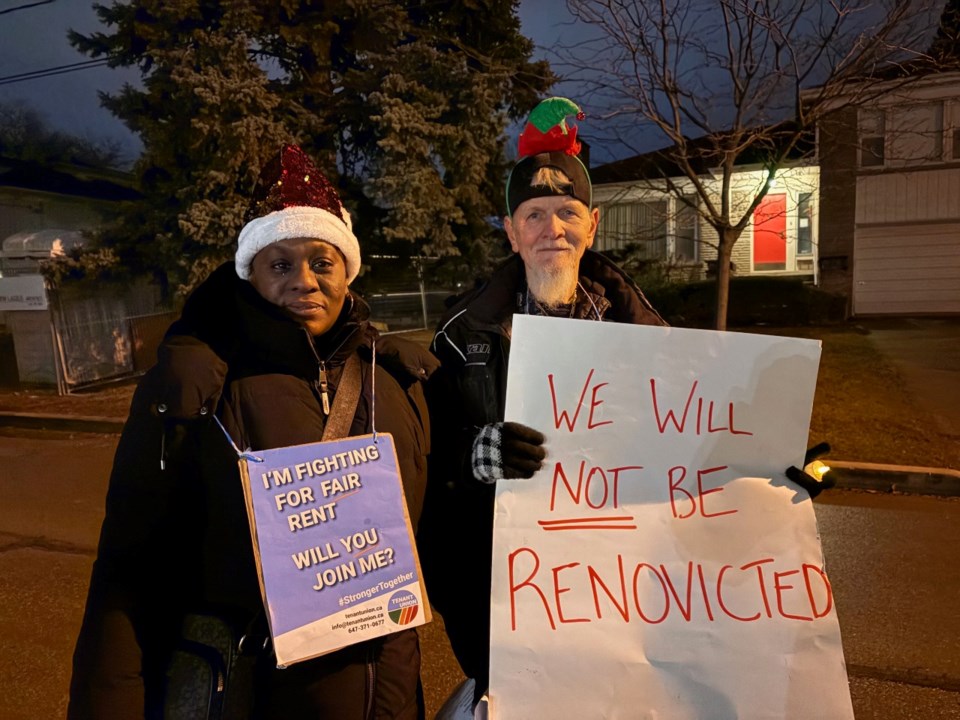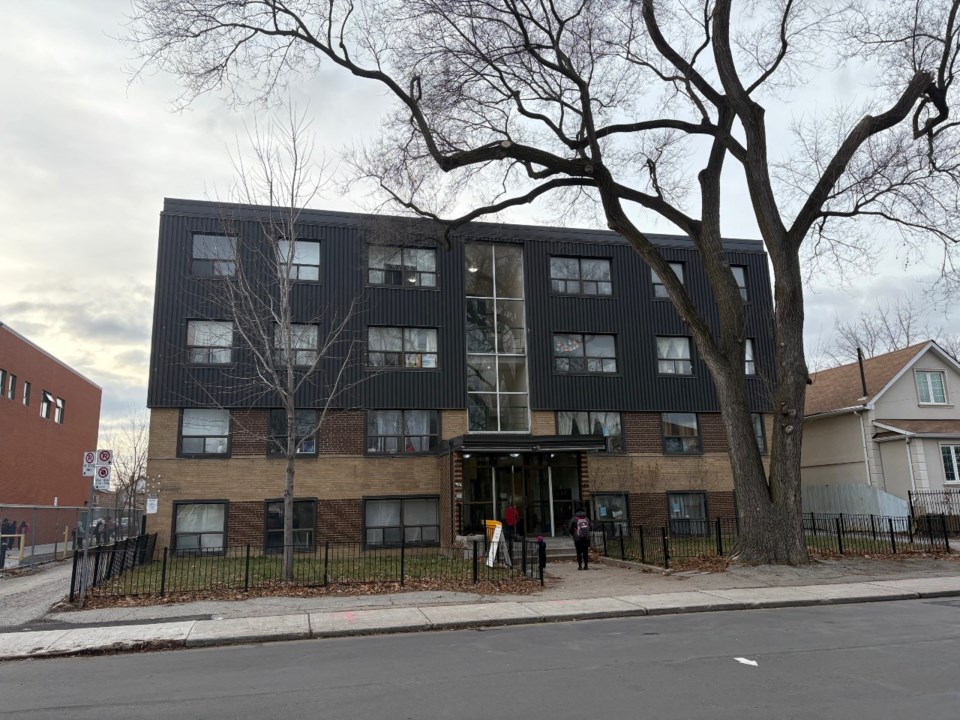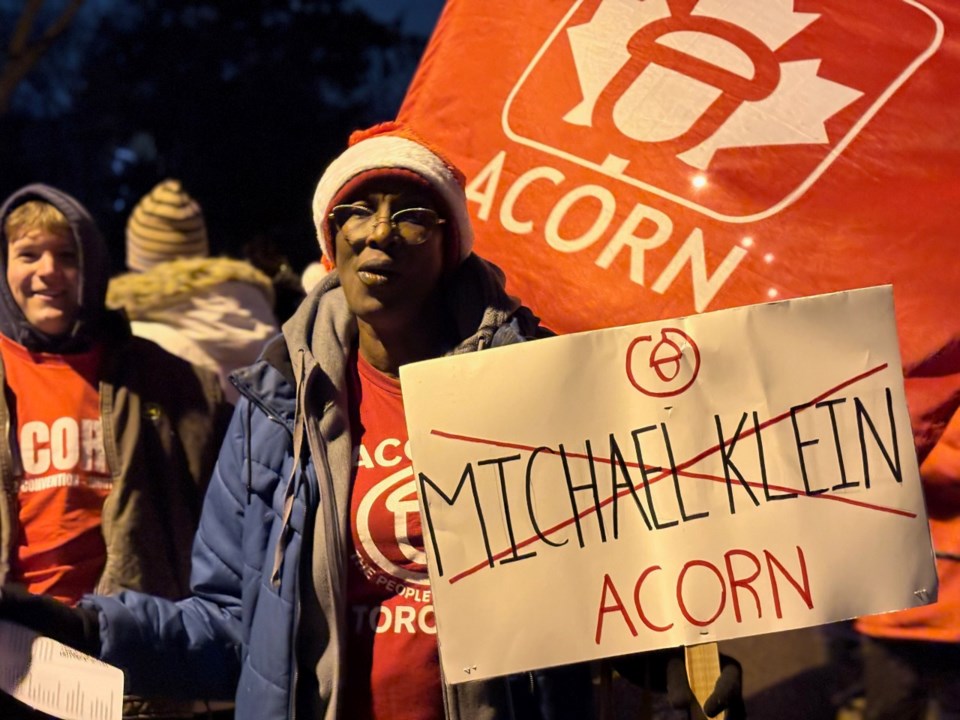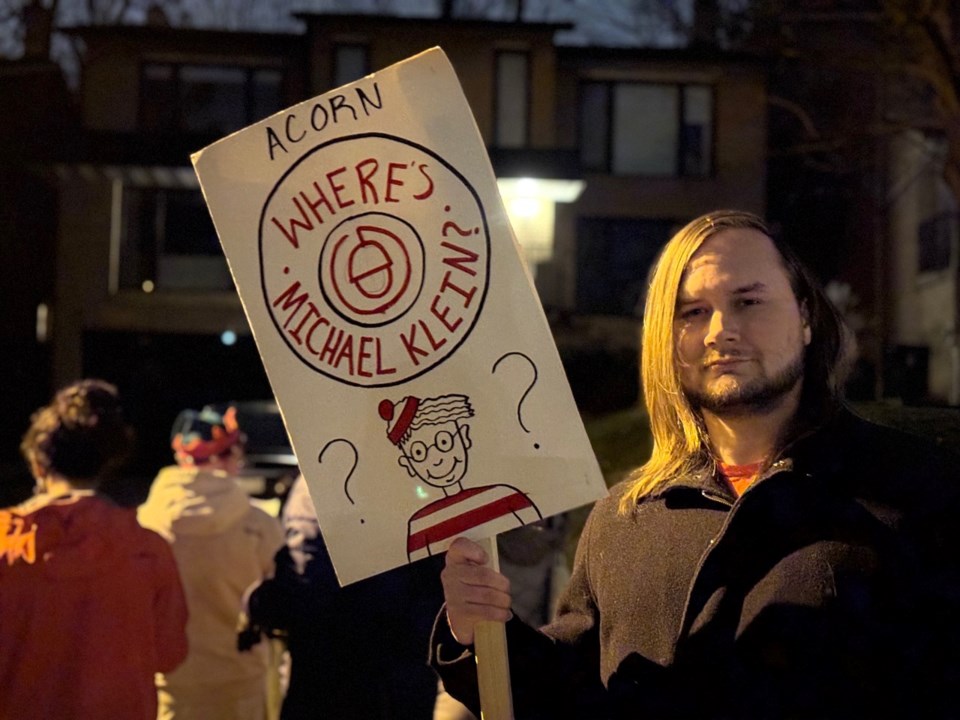Carrying signs and instruments, a group of tenants facing eviction staged a protest one evening last week in front of a home in one of Toronto’s most upscale neighbourhoods. They said the homeowner was Ontario’s most prolific “renovictor,” Michael Klein.
“He’s treating people like absolute garbage,” said Billy Thornhill, a Toronto tenant facing eviction who attended the Forest Hill protest.
“He’s got a very bad heart — a very cold, cold heart.”
In a rare media interview with TorontoToday last week, Klein denied all allegations of improper or illegal actions.
Thornhill is one of more than 25 tenants who received eviction notices this summer and fall at a property in Toronto’s Mount Dennis neighbourhood, owned by a Klein-affiliated company.
Thornhill is a single father who has lived in his apartment at 80 Guestville Ave. for more than 20 years. He said he does not want to leave.
“I know everybody,” he said. “I know the church across the street. I know all the caretakers that clean the school next door. I know everybody and everybody around there knows me.”
Even more than the local connections, however, Thornhill said he’s fearful of losing the rent-controlled apartment where he lives with his son, paying about $1,100 monthly.
If evicted, Thornhill said it would be next to impossible to find another place he could afford.
“Where are you going to go? What are you going to do?” said Thornhill. “What, go to Canadian Tire and buy a tent?”
In October, the tenant advocacy group ACORN published a report linking Klein to 21 properties provincewide.
The report alleged Klein is Ontario’s biggest “renovictor” — and that the businesses he directs have systematically purchased properties that offer reasonably-priced rent, subsequently mass-evicting tenants and charging new residents much higher prices.
The report alleges Klein has been able to “hide” behind multiple separate businesses that own the properties, and that his affiliated buildings contain an estimated 680 units that are undergoing renovictions across seven Ontario cities.
Klein vehemently denied the allegations.
“There’s no such thing as renoviction,” he said.
Klein added that everything his affiliated companies do is legal and according to provincial law.
He said his affiliated companies have never faced any government penalties for evictions — and alleges that ACORN has repeatedly slandered him to the point of considering legal action.
“They may force my litigious hand,” he said.
The protest
On the evening of Dec. 18, protestors from multiple Klein-affiliated properties across the province sang landlord-themed Christmas carols and delivered speeches in front of a Forest Hill residence linked to the businessman, while several neighbours looked on.
Thornhill knocked on Klein’s door, but nobody answered.
Last week, Klein told TorontoToday that he owns, but does not live at the property — a family member resides there instead.
“They made fools of themselves,” he said, of the protestors.
However, Eastwood Burnett, an ACORN member and the tenant of another Klein-affiliated property in Toronto, said organizers have tried to reach the Toronto businessman in a variety of ways without success.
Klein’s businesses have no real head office and the only people available to tenants are property managers who don’t call the shots, Burnett said in an emailed statement.
“Klein left us with no other option,” he said. “We’ve tried everything so what other choice do we have?”

An ominous landlord letter
Thornhill said his renoviction trouble began in late August in the form of a letter from building management.
“We want to let you know that Guestville Apartments Inc. is starting a major renovation project,” it read. “Unfortunately, your unit will not be suitable for living in during this renovation period.”
The letter, obtained by TorontoToday, said the company had “no choice” but to end Thornhill’s lease as of Dec. 31, 2024 — and that the renovations the landlord had planned would take seven to ten months.
It said that under the Residential Tenancies Act, Thornhill was entitled to three months’ rent.
It added, however, that if he voluntarily agreed to leave within a month the company would pay him $6,000 “in good faith.”
Thornhill said he laughed when got the document.
“What are you going to do with $6,000?” he said. “You’d be lucky to [use it to] pay first and last months’ to move in somewhere.”
Klein said the renovations at 80 Guestville Ave. are necessary and long overdue.
“These are 50-year old buildings that have never been renovated,” he said, noting the units need new kitchens, bathrooms and floors.
Thornhill disagreed.
Showing TorontoToday his apartment on Thursday, he said all it needs is a good coat of paint. “It’s a perfect place. These places are dynamite.”
Thornhill alleged Klein’s motive for the renovation is disingenuous.
“Anybody with half a brain could figure out what’s going on here,” he said. “It’s all about money.”
Klein denied the allegation.

Misleading letters?
York South-Weston Tenant Union organizer Bruno Dobrusin said his group has seen a pattern at Klein-affiliated buildings provincewide.
He alleged that one of the key tactics used by the owners to get tenants to vacate their homes is to take advantage of their lack of understanding of their legal rights.
Under Ontario law, landlords can apply to the Landlord and Tenant Board (LTB) through a so-called N13 application for the right to temporarily evict a tenant in order to complete a substantial renovation.
Tenants are allowed to fight the application, however, if they believe it’s possible for construction to be completed while they live there, or if they think the application is in “bad faith.”
Should the construction go forward, tenants are also, crucially, allowed to return to their home upon the construction’s completion, paying the same rent rate as before.
Dobrusin said however, that none of this is made clear to tenants in Klein-affiliated buildings.
“Most people do not know they have a right to a hearing,” he said. “It sounds like a done deal.”
Klein denied the letters are misleading. “It’s very clear and concise,” he said.
Tenants allege poor building upkeep
Dobrusin alleged that Klein-affiliated companies also use poor maintenance as a lever to pressure residents to leave.
Nadine Lewis, another longtime tenant at 80 Guestville Ave. who received a letter like Thornhills’, said the property has been “horrible” since a Klein-related firm took ownership in 2023.
Lewis said there have been days-long stretches where the water and heat have been turned off, garbage is left about, and this summer, flooding in the parking lot was so severe that residents could barely get in and out of their cars.
The mother of three, who has lived in her home for more than sixteen years, said when problems have arisen, the property’s maintenance staff have been near-impossible to reach.
“It’s like you’re talking to a dead end,” she said.
Klein said his affiliated companies do not use maintenance issues to pressure tenants.
Water has sometimes been turned off, but it’s been in the normal course of renovating empty units, he said.

LTB denied Klein-affiliated company an N13 request last month
Sam Mason, a Toronto lawyer, alleged that pressuring tenants to vacate their unit isn’t the only way that Klein-affiliated businesses have sought to increase their profit.
He said he knew of instances where staff of Klein-affiliated companies negotiated “illegal rent increases” with tenants in exchange for dropping proposed major renovations that could force a resident’s eviction.
In support of that view, Mason, who said he is acting for more than a dozen tenants fighting renovictions in Klein-affiliated properties, pointed to a November decision by an LTB tribunal.
In the decision, a Klein-affiliated company was denied an N13. The tribunal said it denied the application, in part, based on evidence the company had negotiated a rent increase with a separate tenant in exchange for withdrawing an N13.
Under the threat of the N13, the resident had agreed to pay nearly $500 more in rent per month for their same unit, according to the tribunal.
The tribunal also denied the N13 because the proposed renovations — which mirror those planned for Thornhill’s unit — “contain[ed] few valid grounds for the request for vacant possession.”
Klein said the LTB tribunal’s decision will be appealed.
He said the situation was complex, that hearsay evidence had been introduced, and that there are two sides to every story. He did not provide additional specifics.
Right to return
Thornhill said he is fearful that if he is evicted using an N13, he might not be allowed back to his apartment, despite it being his legal right.
Marcia Stone, chair of Toronto ACORN's Weston chapter, said that fear has basis in reality.
In Hamilton and Toronto, tenants of companies un-affiliated with Klein have been denied the right to return, according to reports by CBC and Toronto.com.
“It's a simple financial calculation for the landlord. The money they can make from pushing out long term tenants and then doubling rents for someone new far outweighs the fines they might have to pay,” she alleged, in an emailed statement.
Klein however, denied this has ever occurred at properties affiliated with his companies.
“We offer [the right to return] for every tenant [who] obliges by the N13 rules,” he said. “[They] are free, and allowed, and eagerly welcomed back into their units.”
He said tenants of 80 Guestville Ave. who vacate their units for renovation will be “100 per cent” permitted to return after the construction is completed, paying the same rent as before.
As proof, Klein said his affiliated companies have never faced any penalties at the LTB over failing to allow tenants to move back in.
“You cannot find one case that is even outstanding where we have failed to oblige [with a right to return] as per N13,” he said.
Mason said such a statement isn’t as straightforward as it appears, however.
He said in order to be charged with such a penalty, the burden is placed on the tenant to file a T5 application.
Mason said T5s are not common because they require a tenant, “who is probably evicted into more expensive or unaffordable housing” to initiate a legal proceeding against their former landlord.
He said these processes may take years.

Dramatic recent increase in N13s
Stone said the use of N13s in the province has become more prevalent in recent years.
“[Ontario Premier Doug] Ford has allowed Ontario to be open for business and a lot of these corporate landlords are doing business. They’re doing exactly that — using the tenants as a bank machine,” she said.
In a recent report, ACORN found the use of N13s increased by about 300 per cent from 2017 to 2022 — from about 300 in 2017 to about 1,000 in 2022.
In its report, ACORN called on municipal governments to pass strong “anti-renoviction” bylaws, which some have recently done.
In November, Toronto’s city council passed a new renovation licence bylaw aimed at preventing renovictions.
Among other things, it will require a landlord who evicts a tenant for a major renovation to provide the resident with comparable housing at a similar rent for the duration of construction — or to provide payments to make up the difference between their existing rent and the rent they must pay during the construction period.
The bylaw will come into force in July 2025. But until then, tenants must rely on the LTB.
Fighting N13s
Provincewide, dozens of tenants of Klein-affiliated properties are fighting or planning to fight their N13s, according to ACORN.
Among them is Thornhill.
The longtime Mount Dennis resident is defiant, but acknowledged the stress of the N13 process has been hard on his mental health.
“Can’t sleep — depression and anxiety is through the roof,” he said.
Despite this, he said at last week’s protest that he is determined to fight.
“I’m not leaving, I don’t care what happens,” he said.
